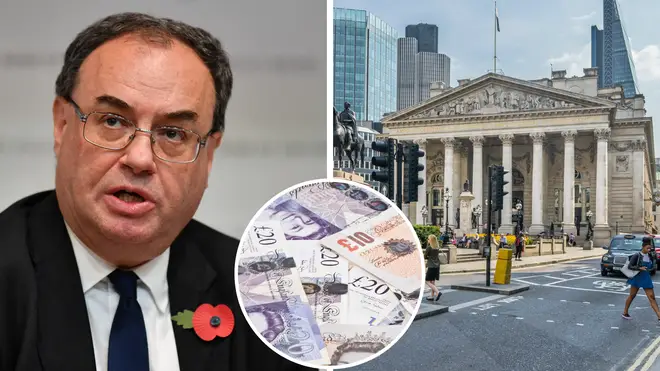
Tom Swarbrick 4pm - 7pm
16 June 2022, 12:04 | Updated: 16 June 2022, 13:02

The Bank of England has raised interest rates to 1.25% for the fifth time in a row.
On Thursday, the Bank of England's monetary policy committee announced interest rates are rising by 0.25% from 1% to 1.25%.
Interest rates are now at their highest level since January 2009.
The central bank said governor Andrew Bailey, Ben Broadbent, Jon Cunliffe, Huw Pill, Dave Ramsden and Silvana Tenreyro backed a quarter point rise, but that three members, Jonathan Haskel, Catherine Mann and Michael Saunders, voted for a larger increase, to 1.5%.
The hike may affect homeowners by increasing the interest rates on mortgages with Money Saving Expert Martin Lewis predicting people with variable rate mortgages will have to pay £12 more a month for each £100,000 they have borrowed.
It comes as the UK grapples with the cost of living crisis which has seen fuel and energy prices soar.
Central projections in the May Monetary Policy Report forecast the UK's GDP growth was expected to slow sharply over the first half of the period.
Read more: Apple court battle could bring huge payout for 25 million iPhone users in UK
The Monetary Policy Committee voted by a majority of 6-3 to increase #BankRate to 1.25%. https://t.co/31MpeWiCKR pic.twitter.com/LyByVYJ8iw
— Bank of England (@bankofengland) June 16, 2022
In minutes of the latest decision, the Bank said Consumer Prices Index (CPI) inflation is now expected to peak above 11% in October.
The Bank said: "CPI inflation is expected to be over 9% during the next few months and to rise to slightly above 11% in October.
"The increase in October reflects higher projected household energy prices following a prospective additional large increase in the Ofgem price cap.
"In the MPC's latest forecasts in May, upward pressure on CPI inflation was expected to dissipate over time.
"In the main, this reflected the stabilisation of the prices of commodities, albeit at elevated levels, and other tradable goods.
"It also reflected the combined impact of weaker real incomes and tighter monetary policy on domestic demand. Monetary policy is also acting to ensure that longer-term inflation expectations are anchored at the 2% target."
Read more: James O'Brien 'scared' by the 'mess' Boris Johnson has left Britain in

UK should not 'self-flagellate too much' over its inflation rate
The Bank's MPC - which sets interest rates - said: "Global inflationary pressures have intensified sharply following Russia's invasion of Ukraine.
"This has led to a material deterioration in the outlook for world and UK GDP growth."
The British Chambers of Commerce (BCC) also cautioned over the impact of the rate rise on businesses.
David Bharier, head of research at the BCC, said: "While expected, the decision to raise the interest rate will add further concern to businesses amid a weakened economic outlook, soaring cost pressures, and labour shortages.
"The increase signals the Bank's intention to tackle inflation but businesses have been raising the alarm about spiralling prices since the start of 2021 and a higher interest rate is unlikely to address many of the global causes of this.
"The increase could impact smaller businesses who may be reliant on banking or overdraft facilities, for instance, those buying goods in bulk in an attempt to offset raw material shortages."